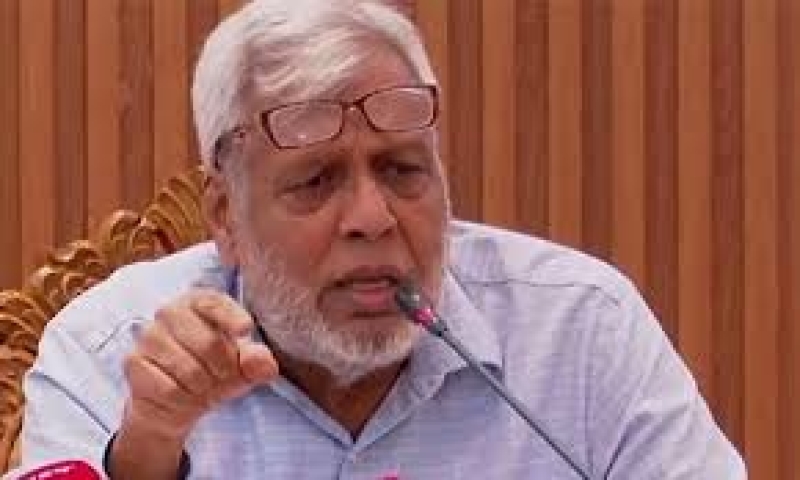- Record low ADP execution rate clouds performance in 2025 |
- Special prayers held nationwide for Khaleda after Jumma prayers |
- Vandalism at Chattogram Airport for food after flight cancellations |
- Nomination of Nagorik Oikya’s Manna, six others scrapped in Bogura |
- Bangladesh Gets Record $32.8bn Remittance in 2025 Year |
Govt Ensures Uninterrupted Power Supply Across the Country

Dr. Muhammad Fouzul Kabir Khan, Power, Energy, and Mineral Resources Adviser
The interim government has placed a strong emphasis on guaranteeing an uninterrupted power supply, alongside its ongoing efforts to reform the power sector by eliminating inefficiencies and reducing dependence on subsidies. The goal is to establish transparency and accountability within the industry.
"Bangladesh is transitioning from subsidies and inefficiencies to a new era of transparency and accountability in the power and energy sector. This transformation is essential for the sustainable future of our critical energy infrastructure," said Dr. Muhammad Fouzul Kabir Khan, Power, Energy, and Mineral Resources Adviser, in a recent interview with BSS. This statement marks the completion of six months under the current interim government's leadership.
Dr. Khan expressed optimism about the future, noting that energy prices could decrease as the government prioritizes renewable energy production and efficiency improvements within the sector. "We’ve reinstated the Energy Regulatory Commission’s (BERC) authority to set electricity tariffs. Additionally, we are revising the Integrated Energy and Power Master Plan (IEPMP) and reassessing the renewable energy policy to increase its share in the national energy mix," he added.
Speaking at a recent function, Khan also highlighted that Bangladesh would require an estimated $3.5 to $4 billion annually in transition finance to achieve net-zero emissions by 2050. He emphasized the government's move away from reliance on independent power producers (IPPs), signaling a shift toward more sustainable energy policies.
According to a Bangladesh Power Development Board (BPDB) official, the country generated 11,541 MW of electricity on February 6, with a peak generation of 16,477 MW on April 30, 2024. Currently, Bangladesh boasts a generation capacity of 31,144 MW from 133 captive and renewable plants, with an additional 2,656 MW coming from foreign sources.
The transmission network has been expanded to 16,060 circuit kilometers, and the capacity of grid substations has increased to 73,991 Megavolt Amperes (MVA). The total distribution line across the country spans 648,724.72 kilometers as of June 30, 2024. The number of consumers has reached 47.7 million, with 4.87 million irrigation connections. System losses have now been reduced to 7.25%.
Since assuming office in August 2024, Dr. Khan has introduced a series of reforms in the power and energy sector to safeguard the national interest. He pointed out that the government has implemented measures to prevent malpractices, including the formulation of transfer and recruitment policies.
In a significant move toward enhancing transparency, the government promulgated an ordinance on November 30, 2024, repealing the Quick Enhancement of Electricity and Energy Supply (Special Provision) Act 2010. This measure is aimed at ensuring greater transparency in power production.
The government has also made progress in securing long-term energy supply agreements. A recent heads of agreement (HOA) was signed with US-based Argent LNG to import up to 5 million tonnes of liquefied natural gas (LNG) per year over the next 20 years. The non-binding agreement was signed by Ashik Chowdhury, Executive Chairman of the Bangladesh Investment Development Authority, and Jonathan Bass, Chairman and CEO of Argent LNG, at a ceremony held at the Bangladesh Embassy in Washington, DC, on January 24, 2025.
Further advancing its energy strategy, the government has issued an open tender for the establishment of 12 grid-tied solar power plants across the country in the private sector. The Bangladesh Power Development Board (BPDB), as the sole authority in the power sector, published the tender in several newspapers to invite potential bidders for these projects.
These 12 solar power plants, with a combined capacity of 323 MW, will be situated in various locations across Bangladesh, including Noakhali (10 MW), Hathazari (18 MW), Nilphamari (20 MW), Moulvibazar (25 MW), Bajitpur (25 MW), Rangamati (25 MW), Ukhiya (30 MW), Nawabganj (35 MW), Kurigram (45 MW), Fatikchhari (45 MW), and Bhaluka (45 MW).
The government’s continued investment in energy infrastructure and commitment to sustainability highlights its long-term vision to enhance the nation’s energy security and move towards a greener, more reliable power sector.

